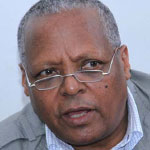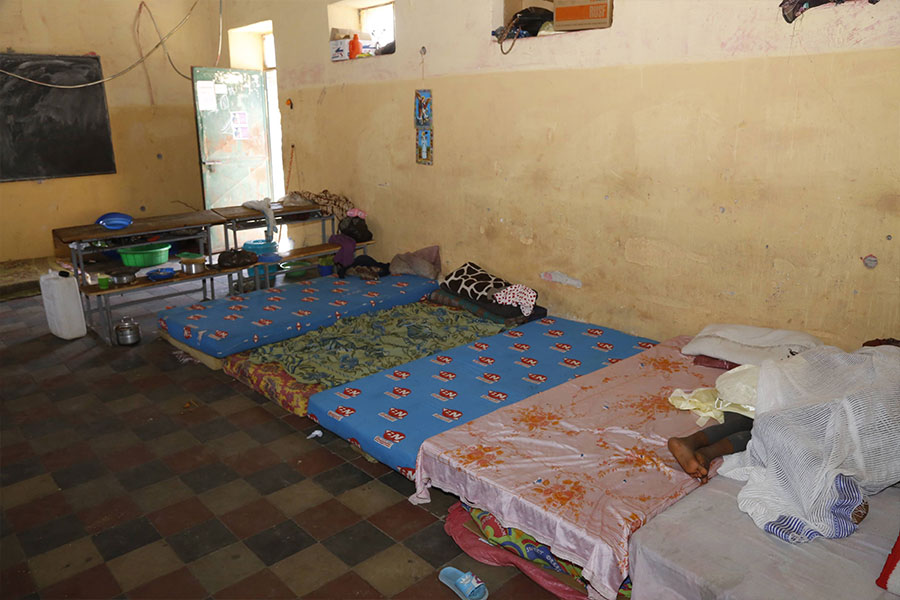
Oct 5 , 2019
By Yonas Biru (PhD)
The author of The Magic of Thinking Big, David J. Schwartz, has many quotable quotes, chief among them are: “The mind is what the mind is fed” and “Look at things not as they are, but as they can be.”
In Ethiopia, as in most African countries, the economic debate is often devoted to specific policy issues like macroeconomic stabilisation, trade and privatisation. As important as these issues may be, a country’s economic destiny does not depend on any specific policy matter.
My purpose here is to spur the debate on the economic vision of Ethiopia and why forging a national economic vision is a critical determinant of the country's long-term prosperity. The questions “What should Ethiopia’s economic vision for 2050 be?” and “What strategic plan is necessary to achieve it” are far more critical than fine-tuning macroeconomic policies in any one period. Most Asian countries that have registered accelerated growth are those who dared to dream big and aspired to achieve it through well-designed strategies and appropriate policies.
In a Bloomberg opinion piece titled “Ethiopia Already Is the ‘China of Africa,’” Tyler Cowen (Prof.), the author of 21 critically acclaimed economic books, argued Ethiopia is destined to take off if proper policies are put in place.
His statement goes beyond Ethiopia’s growth statistics of recent years and focuses on “an undervalued common feature” between Ethiopia and China. “Both countries feel secure about their pasts and have a definite vision for their futures.” He went on to state: “Like many Iranians, [Ethiopians] think of themselves as a civilisation and not just a country. And, as in China, they hold an ideological belief that their country is destined to be great again.”
In his speeches, Prime Minister Abiy Ahmed (PhD) often taps into our past glory as a reservoir for our self-reliance and inspiration to re-imagine our future. Sadly though, the enthusiasm and revved-up cacophony of cheers are swallowed by the vacuum in the oceanic gap that exists between his broad vision and his administration’s ability to understand its disruptive novelty and transformative utility.
Obviously, his broad vision of reclaiming Ethiopia’s glorious period needs to be distilled down to manageable signature elements with clear strategies, road maps, goalposts, policies and implementation and monitoring plans.
What is incredibly disheartening is the concern aired by local experts that such important tasks are delegated to a plethora of external consultants and international agencies, many of whom are influenced by the so-called “good enough” principle.
Coined by a Harvard professor and World Bank consultant, Merilee S. Grindle, the principle of “good enough” is about encouraging developing countries to temper their expectations, taking into consideration the milieu of factors that contribute to the state of underdevelopment.
The concept had existed long before Grindle christened it as a guiding principle to “curb the tendency toward idea inflation” and reign in development strategies of poor countries that are victims of “inflated expectations.” What is wrong with such pragmatic advice?
It is not a prescription for a disruptive and transformative vision. It is a normalisation of low expectations and, therefore, a panacea for stagnation. In all fairness, the intention of a “good enough” principle, both before and after Grindle’s report surfaced, was not the dumbing down of Africa’s economic vision or strategic aspiration. Nonetheless, the unintended consequence was just that.
Vision should be the key to looking at things not as they are but as they could be. A curbed and reigned in vision saddled with low expectations and aimed at low hanging fruit neither inspires nor sustains a nation’s drive for greatness.
No wonder international agencies cannot name a single Sub-Saharan African country as a model for development strategy after 50 years and hundreds of billions of dollars in development assistance. If Africa’s development trajectory of the past half century can serve as a prologue for the future, it will be difficult to avoid the conclusion that Africa will not pull itself out of its poverty-stricken state of misery until it starts to ask hard questions.
The principal question is: Why is Africa stuck in a low equilibrium trap, while Asian countries that shared many similarities with it inthe 1960s managed to buck expectations and advance to a higher development stage?
The difference is due in large part to two important factors. Most Asian countries, including China, India, and Korea, have been in charge of the authorship and ownership of their economic visions. To put it in the vernacular, Asian countries understood early on that an intellectually orphaned country that is put under the guardianship of foreign agencies would forever remain dependent.
In Africa, the development knowledge space and the vision that springs out of it is unduly influenced, if not, totally dominated by international organisations. In the best of circumstances, local experts and think tanks are chatting at the margin. Most commonly, they are consigned outside of the knowledge-power balance trapped between the hinterlands of second-tier and second fiddle.
Juxtaposing development policies that are tainted with variant strains of “good enough” principle and the resultant “piecemeal” reform modality on the Prime Minister’s vision to reclaim Ethiopia’s greatness is fitting a Ferrari with a Volkswagen engine, if not a steam locomotive.
The other difference between Asia and Africa emanates from the absence or paucity of an established national knowledge base and research outlets in Africa. The problem is compounded by the continent’s failure to harness its diaspora, whereas most Asian countries, including China, India and Korea, relied on their diaspora. As a consequence, Africa has handed over its economic destiny to external experts and international agencies. Therein lies its perpetual poverty.
Speaking of the World Bank’s dominant role in development research, Professor Joseph Stiglitz, Nobel Laureate and former senior vice president and Chief Economist of the World Bank, raised a red flag stating: “The Bank’s predominant role in development research is so strong that, were it involved in the production of an ordinary commodity, it might be accused of anti-trust violation, dominating an industry... There is a risk that the Bank uses its financial resources to divert research towards the agenda which it is pushing, and away from concerns of those in the country...”
Though the dominance of international agencies in economic development research is a concern in all developing regions, the risk is far more pronounced in Africa. This is due in large part to the absence of alternative national knowledge space.
African think tanks are underfunded, understaffed and often marginalised. Research universities that can provide an alternative knowledge space are virtually non-existent in Sub Saharan Africa. There are many organisations that rank the top 1000 universities around the world, including the University Ranking and The Center for World University Rankings. Neither lists a single Sub Saharan Africa University in the top 500 outside of South Africa. Only three (two in Uganda and one in Ghana) appear in the top 1000.
Ethiopia’s higher learning institutions may exist outside the global knowledge base radar screen. But a large number of its nationals both in the homeland and diaspora are well tooled to forge an economic vision and provide their motherland with the knowledge base needed to uplift her. Though the Prime Minister often makes a clarion call to the diaspora, it is not clear he has gained the buy-in from his high-brass officials.
A year ago, Professor Lemma W. Senbet (PhD) and I co-authored a proposal to establish an independent Ethiopian Economic Advisory Council. The objective was to create a platform for Ethiopian economists of national and international repute both at home and abroad to help create a national economic vision and provide an alternative knowledge space in the country’s development endeavour.
The proposal was prepared in August of last year and the co-authors established a steering committee, consisting of eight experts and finalised the proposal with substantial input from local and diaspora experts as well as Ambassador Kassa Tekleberhan. The final draft was then duly transferred to the Prime Minister’s Office.
Despite numerous calls and email communications from different officials in the Prime Minister’s Office indicating the Prime Minster's support to the initiative, for reasons amenable neither to logic nor intuitive perception, the initiative has been frozen between the administrative chambers of neither and nor. It has neither been officially endorsed and launched nor rejected and shelved.
Ethiopians in the diaspora regard helping their mother country as a duty. They await their country’s beacon call to contribute their fair share in making its economy a new frontier for national inspiration.
Ethiopia is blessed with gifted children both at home and abroad and should not be condemned to the ranks of intellectually orphaned countries and put under guardianship.
PUBLISHED ON
Oct 05,2019 [ VOL
20 , NO
1014]


Life Matters | Aug 06,2022

Commentaries | Dec 24,2022

Verbatim | Jun 08,2019

Viewpoints | Oct 07,2023

Viewpoints | Mar 23,2019

Commentaries | Jan 07,2024

View From Arada | Mar 19,2022

Agenda | Mar 27,2021

My Opinion | Apr 30,2022

Fineline | Apr 25,2020

My Opinion | 131658 Views | Aug 14,2021

My Opinion | 128022 Views | Aug 21,2021

My Opinion | 125985 Views | Sep 10,2021

My Opinion | 123609 Views | Aug 07,2021

Dec 22 , 2024 . By TIZITA SHEWAFERAW
Charged with transforming colossal state-owned enterprises into modern and competitiv...

Aug 18 , 2024 . By AKSAH ITALO
Although predictable Yonas Zerihun's job in the ride-hailing service is not immune to...

Jul 28 , 2024 . By TIZITA SHEWAFERAW
Unhabitual, perhaps too many, Samuel Gebreyohannes, 38, used to occasionally enjoy a couple of beers at breakfast. However, he recently swit...

Jul 13 , 2024 . By AKSAH ITALO
Investors who rely on tractors, trucks, and field vehicles for commuting, transporting commodities, and f...

Jun 28 , 2025
Meseret Damtie, the assertive auditor general, has never been shy about naming names...

Jun 21 , 2025
A well-worn adage says, “Budget is not destiny, but it is direction.” Examining t...

Jun 14 , 2025
Yet again, the Horn of Africa is bracing for trouble. A region already frayed by wars...

Jun 7 , 2025
Few promises shine brighter in Addis Abeba than the pledge of a roof for every family...

Jun 29 , 2025
Addis Abeba's first rains have coincided with a sweeping rise in private school tuition, prompting the city's education...

Jun 29 , 2025 . By BEZAWIT HULUAGER
Central Bank Governor Mamo Mihretu claimed a bold reconfiguration of monetary policy...

Jun 29 , 2025 . By BEZAWIT HULUAGER
The federal government is betting on a sweeping overhaul of the driver licensing regi...

Jun 29 , 2025 . By NAHOM AYELE
Gadaa Bank has listed 1.2 million shares on the Ethiopian Securities Exchange (ESX),...